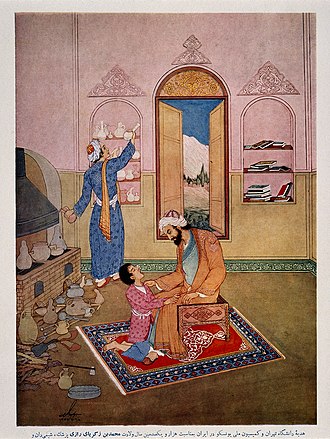Facts for Kids
Abu Bakr al-Razi was a Persian doctor and philosopher known for his pioneering contributions to medicine and chemistry during the Islamic Golden Age.
Overview
Philosophical Ideas
Chemical Discoveries
Early Life And Education
Impact On Modern Science
Major Works And Writings
Contributions To Medicine
Influence On Later Scholars
Legacy In Islamic Golden Age
Comparative Analysis With Other Polymaths

Inside this Article
Critical Thinking
Encyclopedia
Al-khwarizmi
Middle East
Middle Ages
Philosophy
Chemistry
Abu Bakr
Medicine
Disease
Did you know?
🎉 Abu Bakr al-Razi was born around 865 CE in Ray, Iran.
🌟 He was one of the first to separate medicine from religion.
💉 Razi discovered how to treat smallpox by studying the disease's effects.
📖 He wrote the book 'Kitab al-Mansuri,' which helped train doctors.
🧠 Razi emphasized experimentation and questioning traditional beliefs.
🔬 He conducted many experiments in chemistry, which he called 'alchemy.'
🌙 Razi was a major figure during the Islamic Golden Age.
🩺 He created an encyclopedia of medicine called 'Kitab al-Hawi.'
🎓 Razi grew up with a wealthy family that provided him a great education.
🌍 His work influenced many later scholars and shaped modern science.
Introduction
He is known for being one of the first to separate the science of medicine from religion. Razi was curious about how the body worked and aimed to help sick people. His ideas were very important during the Islamic Golden Age, a time when many great thinkers lived and shared knowledge! 🌟
Razi loved writing and sharing his discoveries with everyone, making him an important figure in history!
Philosophical Ideas
He believed in the importance of reason and observation instead of only relying on ancient texts. Razi argued that every idea should be tested through experiments. He also thought that one should never fear questioning traditional beliefs! 💭
His new way of thinking influenced many other scholars in the Islamic Golden Age and helped develop critical thinking skills that we still use today in all forms of science!
Chemical Discoveries
He conducted many experiments to understand materials and how they change. For instance, he studied the properties of acids and bases, discovering how to create substances like sulfuric acid! 🔥
Razi's experiments led to improvements in medicine and even helped support the later development of modern chemistry. His ideas were groundbreaking for the time and shaped how scientists view chemical reactions today!
Early Life And Education
He studied many subjects, including philosophy and chemistry, which helped shape his future as a scientist. Curious from a young age, he wanted to learn everything he could about the world. 🌍
It is said that he studied under famous teachers and became interested in medicine when he realized he wanted to help people feel better. Razi's early studies set the stage for his later amazing discoveries!
Impact On Modern Science
His theories about disease caused by germs and the importance of proper cleanliness laid the groundwork for modern hygiene practices. Razi's experiments sparked the beginning of the scientific method, which is still used by scientists everywhere! 🔍
Thanks to his curiosity and dedication to learning, we have learned so much about health and medicine. Razi's legacy lives on in medical research and teaching around the globe! 🌎
Major Works And Writings
He also wrote "Kitab al-Mansuri," which discussed surgical techniques and patient care. Razi's writings were not just for doctors; they were easy to understand for everyone! 😊
This is why many of his works have survived through the years, and you can still find and read them today!
Contributions To Medicine
He wrote a book called "Kitab al-Mansuri," which became a training guide for doctors. In it, he explained how to identify different illnesses and their symptoms. He also performed surgeries and discovered how to treat smallpox, a dangerous disease, by understanding its effects on the body. 💉
Razi's work helped improve safety and health for many people, saving countless lives and influencing future medicine!
Influence On Later Scholars
His books were translated into Latin and studied across Europe during the Middle Ages. Scholars like Avicenna, who came after Razi, built on his ideas and discoveries. 👩
🎓 Because of Razi's emphasis on careful observation and experimentation, later scientists learned the importance of questioning beliefs and seeking evidence. His influence can be seen in the way medicine and chemistry developed over the centuries!
Legacy In Islamic Golden Age
This was a time when many advancements in science, art, and literature occurred, especially in the Middle East. His work helped lay the foundation for modern medicine. Razi's stress on observation and experimentation encouraged other scholars to explore new ideas. 🌈
His legacy is still celebrated today, as scientists and students study his writings and learn from his innovative approach to understanding the world.
Comparative Analysis With Other Polymaths
While they all contributed to various fields, Razi focused mainly on medicine and chemistry. Unlike Ibn Sina, who wrote extensively about philosophy and medicine, Razi preferred a practical approach. 🌍
This made him a unique thinker in his time! The combined works of these polymaths helped shape modern science and pave the way for future discoveries!

